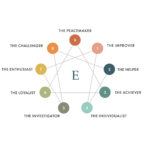“Why does everyone else seem more confident than I am?”
“If I try harder to seem successful and happy, maybe I’ll start to feel like I actually am.”
“I should just focus on getting to where I need to go. Once I’m there, I’m sure I won’t feel so bad all the time.”
If these types of thoughts sound familiar, you might be dealing with imposter syndrome. Sometimes, imposter syndrome is brought on by an inability to fully process and be vulnerable with your emotions.
How does identifying your feelings come into play when it comes to imposter syndrome? Let’s talk about how being able to connect to your emotions might help you feel more comfortable and confident in every area of life.
What is imposter syndrome?
Imposter syndrome is the pervasive inability to believe that you deserve the success you have achieved or the good things you experience. It can also be a persistent feeling that you don’t actually belong in the groups you associate with.
An example of this in the workplace would be struggling to feel like you are actually supposed to be in the manager’s meeting with all the other managers. Even though you worked hard to become a manager yourself, you still feel like everyone else is having an easier time in their role than you are.
You might put on a brave face, but underneath you feel as though everyone else in the room is more deserving of their position than you are.
In personal relationships, someone with imposter syndrome may struggle to accept that they are worthy of a healthy relationship. They may also avoid emotional vulnerability with others in order to keep up appearances of a “successful” relationship… Even if there are problems that need to be addressed.
Can identifying your feelings help prevent imposter syndrome?
If you are someone who places a high value on your achievements and the appearance of success, it may be difficult to present an authentic version of yourself to others. You may begin to avoid your feelings if you fear that they are negative or unproductive.
However, when you suppress your feelings, you can become unsure of what it is you are even feeling in the first place. When you ignore these “negative” emotions instead of naming and expressing them, they become more and more difficult to process.
Distracting yourself from your feelings by rushing on to the next thing and constantly focusing on the next goal can become a way of life that leads to feelings of loneliness, emptiness, and confusion. Even outward successes will be less fulfilling if you are conflicted internally.
When you are able to slow down and connect with what is going on in your inner world, you can learn to process your emotions in a healthier, more productive way. When your inner world is at peace, it becomes easier to fully enjoy and celebrate your achievements in an authentic way.
Practice naming your emotions with compassion.
Learning to name your feelings when you haven’t spent a lot of time doing so can be an overwhelming thought. Even if you are ready to slow down and connect with your inner self, how do you begin to practice that?
Accepting your feelings is not a one-time shift in perspective. It is a lifelong practice of becoming more self-aware. You must be willing to set aside the idea of there being an end goal and give yourself permission to simply be who you are and experience your feelings as they present themselves.
One way to begin this practice is to start observing your emotions without judgment. Instead of trying to “fix” your negative feelings by ignoring them by reaching for your next goal, get curious about them.
Once you learn to remove the same around your feelings, it will become easier to move through them in a productive way and bring alignment between your inner and outer worlds.
How to identify your feelings when you aren’t sure what they are.
If you have spent a long time ignoring your feelings, you might not even be sure how to recognize them anymore! There are a few ways to start observing and identifying what it is you are feeling.
- If something good happens, take a moment to notice how it feels. Does your body feel warm, tingly, or relaxed? Do you smile more easily?
- When you experience something negative, try to withhold self judgment as you notice your body. Are you feeling a tightness in your chest? A clenched throat?
- When your feelings are unclear, take some time to breathe deeply and simply acknowledge the confusion. Writing out your thoughts can also help.
There are many clues to your inner world, and you get to be the detective that starts putting the pieces together! Don’t be afraid to get curious about yourself and your emotions in order to create a fuller picture of who you are on the inside.
Often, our feelings might not seem to line up with what is going on around us, but that does not make them unimportant. They might be trying to tell you something that you need to hear, and ignoring them will lead to eventual frustration and resentment in many areas of life.
Why vulnerability matters.
It can be easy to want to present your “best face” to the world. Many people feel the desire to be seen as successful and important. But if you are denying or ignoring your feelings in order to present what you think is the most attractive version of yourself, you are denying yourself the gift of vulnerability and being “real.”
Imposter syndrome can develop when you are ignoring feelings that you see as “unhelpful” or “negative” in order to be seen as successful. Once you are able to recognize and discuss your feelings with a safe inner circle of people, you can more easily move through those negative feelings and come to a place of acceptance and even pride about yourself in ways you may not have been able to before.
You might be surprised to find that as you become more open and honest with yourself and those close to you, they will begin to do the same. Vulnerability creates connection, and connection builds community. Supportive communities build feelings of success and empowerment!
If the idea of beginning to name your emotions with compassion in order to overcome imposter syndrome still feels daunting to you, I would love to connect with you. My personal and professional coaching services are designed to help you find the strategies that work for you, no matter what stage you are in your journey.






